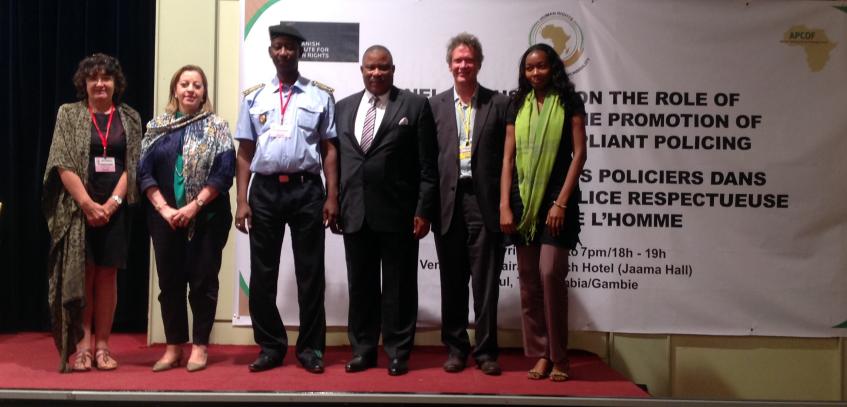The African Commission on Human and Peoples’ Rights (ACHPR), in collaboration with the African Policing Civilian Oversight Forum (APCOF) and the Danish Institute for Human Rights (DIHR) held a panel discussion on the role of police officers in promoting human rights-compliant policing on the margins of the 56th Ordinary Session of the ACHPR. The discussion was facilitated by Sean Tait (APCOF), and participants from State Parties, NHRIs and civil society heard from Commissioner Med S.K. Kaggwa (ACHPR), Monique Alexis (DIHR), Commissioner Maman Abdel Kader (West African Police and Human Rights Platform), Commissioner Maya Sahli Fadel (ACHPR), and Josiane Tapsoba (ACHPR). The event also presented the fourth and fifth editions of the Policing and Human Rights Newsletter, a co-publication of the ACHPR, APCOF and DIHR.
Commissioner Kaggwa spoke first, providing context for the panel discussion. He reflected on the collaboration between ACHPR, APCOF and DIHR in the area of policing and human rights, which has been expressed through the publication of the Policing and Human Rights newsletters, and the establishment of a focal point for policing within the ACHPR Secretariat. He acknowledged the recent establishment of the West African Police and Human Rights Platform (POLI.HR) and the African Regional Police Organisation (AFRIPOL), noting that a discussion on policing and human rights in this context is opportune, and invited participants to add their experiences and knowledge on policing and human rights to the inputs made by speakers during this event.
Commissioner Kaggwa was followed by Monique Alexis from DIHR, who spoke about the challenges faced by the police in respect of human rights. She detailed the methodology adopted by DIHR in its policing and human rights work, which includes a baseline study and the development of police training materials to address any identified gaps between the normative framework for human rights and the actions of police, as revealed in the baseline study. Based on this methodology, Ms. Alexis identified a number of challenge areas, based on DIHR’s work in Denmark and across West Africa. These include recruitment, inadequate training, limited knowledge by police officers of human rights norms (particularly in the context of public order management, use of force and firearms, use of arbitrary arrest and in anti-terrorism activities), lack of resources allocated to police to carry out their mandate effectively, discriminatory practices, failure to sanction police who fail to comply with the law, and poor conditions of detention in police holding cells. Ms. Alexis concluded by encouraging stakeholders to strengthen internal and external oversight, including parliamentary oversight, and promoting the right to freedom of expression for police officers.
Commissioner Kader from the National Police of Niger, speaking on in his capacity of member of POLI.HR, then presented on the recently established POLI.HR. He outlined the context for the establishment of POLI.HR, its objectives, the organs that constitute the platform, and its membership. Commissioner Kader recalled the idea of establishing a common platform for policing and human rights to provide interaction between the national police of Niger, Mali and Burkina Faso from a 2013 meeting between these three institutions and DIHR. The founding document of POLI.HR reflects these aims, and highlights the important role played by national police in upholding and respecting human rights. The objectives of POLI.HR were provided by Commissioner Kader as to promote human rights in policing in West Africa and to contribute to the promotion of human rights alongside other national, regional and international institutions (such as the ACHPR) through enhanced police training, dissemination of human rights documentation and enhanced technical and financial capacities.
Following Commissioner Kader’s presentation, Commissioner Maya Sahli Fadel introduced another regional policing initiative – the recent establishment of AFRIPOL. Commissioner Fadel noted that resolving problems associated with policing and human rights require bringing police into the conversation, and that an opportunity to do so now exists with the establishment of AFRIPOL. Commissioner Fadel recalled the establishment of AFRIPOL in 2014 through the Algeria Declaration, which underscored the commitment of African policing institutions to work together to address transnational crime and terrorism, and to better coordinate policing activities across the continent. The Commissioner suggested that AFRIPOL can contribute to the promotion of human rights within national police by providing an example to these organisations through adoption of a human rights-based approach to its activities. Noting that AFRIPOL is not yet operational (pending the drafting of its governing text), Commissioner Fadel invited all human rights defenders to provide input, undertake sensitisation activities and advocacy with stakeholders involved in the establishment of AFRIPOL, including the ad hoc Peace and Security Council of the Africa Union, to ensure that AFRIPOL takes a rights-based approach to its work. She concluded by affirming that ACHPR will do all it can to remind AFRIPOL of its important role in promoting human rights.
The final presentation was made by Josiane Tapsoba, the Police and Human Rights Focal Point at the ACHPR Secretariat, who introduced the fourth and fifth edition of the Policing and Human Rights Newsletter. Ms. Tapsoba provided a historical background to the development of the newsletters, which are collaboration between ACHPR, APCOF and DIHR, and led participants through the content of the two most recent newsletters, highlighting articles written by ACHPR Commissioners.
From the participants intervention, two main recommendations came up from the participants: the need to engage a discussion between Police officers and other relevant actors of the criminal justice system such as prosecutors, magistrate and the need to go beyond Police officers and expand the Commission’ sensitization activities to all Law enforcement Agencies. Commissioner Med Kaggwa closed the Panel Discussion with concluding remarks that focused on the need to involve the police in discussions about human rights. He called on all participants to engage police agencies on issues of recruitment, training and human rights knowledge.








